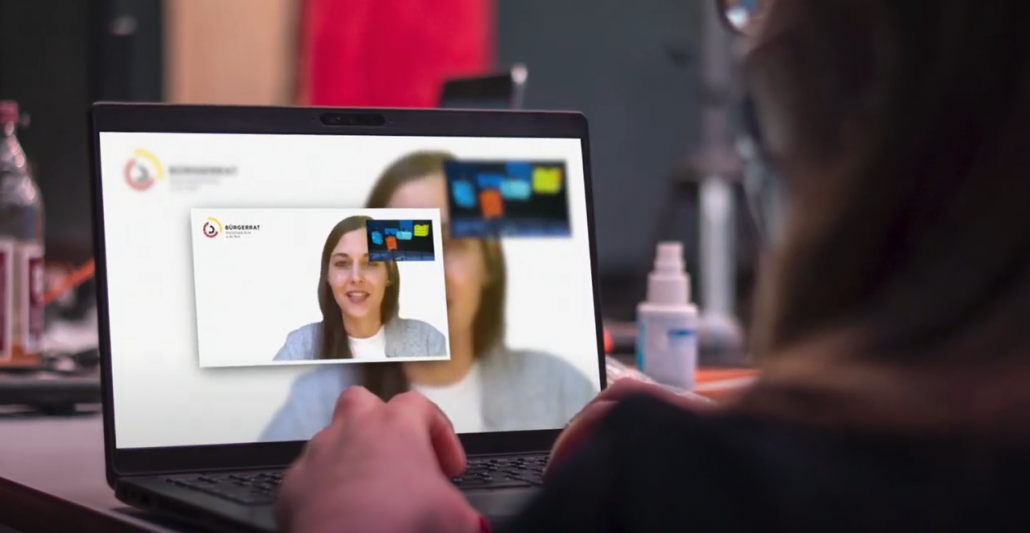The Citizens’ Council on Germany’s role in the world ended on February 20 after a total of ten digital sessions with 160 citizens. Our task now is to evaluate and consolidate the results and prepare them for submission to the government.
This is a good time for us to draw conclusions: From the Citizens’ Council “Germany’s Role in the World,” from the process and from Citizens’ Councils in general. Our conversational partner: Jacob Birkenhäger. He is ifok project manager of the current Citizens’ Council and already accompanied the Citizens’ Council “Democracy”.
Hello Jacob, nice of you to take the time for an interview. The Citizens’ Council recently had its last meeting. What are the key results?
Jacob Birkenhäger: Basically, the Citizens’ Council looked at Germany’s role in the world based on five thematic areas:
- Sustainable Development
- Economy and trade
- Peace and security
- Democracy and the rule of law
- European Union
The results are just as diverse. There is one demand every thematic team expressed: Germany should stand up more strongly for its values in the world. These include fairness, human rights, basic democratic values, good working conditions worldwide and sustainability. There were particularly clear calls for Germany to commit itself globally to greater sustainability and climate protection. For example, the Citizens’ Council recommends introducing a sustainability ministry in Germany and monitoring ecological standards in supply chains more closely. A detailed evaluation of the results is still to come.
Did the discussions also cover controversial points?
Jacob Birkenhäger: Yes, they did frequently. For instance the question whether we want to cooperate as partners with other countries or move forward independently. The Citizens’ Council came to the conclusion that, in principle, we have a stronger position and can achieve more when we cooperate with other countries. However, if we are stuck on certain issues with our partners, then we should in turn act more independently. This is true for issues such as sustainability, migration and the Supply Chain Act: The recommendation is that Germany should go ahead and pass its own law while at the same time working toward a European solution.
The discussions about Germany’s role as a model for other countries were also interesting. The council members ultimately came to the conclusion: We don’t make ourselfes a role model. It is others who make us role models. Only when other countries perceive us to be role models while we credibly and consistently act in line with our values we can live up to this expectation.
These appear to be very nuanced results…
Jacob Birkenhäger: That is true, and it also illustrates what such a process brings to the table: By carefully weighing different goals we can find joint solutions which can ultimately find a broad consensus. Those are not always new solutions, but they are the result of sober consideration and detached from personal interests, purely for the common good. This is a great strength of citizens’ councils.
You held the Citizens’ Council online. How did that go?
Jacob Birkenhäger: It went surprisingly well. We managed to include almost all of the 160 ctizens permanently. Only a small number left the Citizens’ Council, usually due to their bad internet connection. Why was there such a high level of participation? This can certainly be attributed to us providing constant tech support from the start. We gave several technical briefings, supported by delivery of webcams or headsets, and a hotline for tech support that was manned throughout the entire event. The participants learned very quickly and actively engaged online.
What would you do differently next time? What were some particular challenges?
Jacob Birkenhäger: The issue was inherently very complex and very broad. Dividing the participants into travel groups helped to do the many subtopics justice. But we should encourage the communication between the groups more next time. It was a particular challenge to plan the entire process. How do you find the perfect balance between an interative process design that has the courage to leave specific points open and precise planning upfront?
What do you take away from this project for ifok? What did we learn?
Jacob Birkenhäger: The Citizens’ Council showed that we at ifok are capable of guiding highly complex processes – even on specialist subjects like foreign policy. The constellation of actors was very complex: The issue was raised by the Bundestag and our clients were the registered association mehr Demokratie (“more democracy”) and Es geht LOS! (“here we GO”). We cooperated with two additional institutes and were accompanied by an evaluation team during the entire process. We also owe it to our great team of roughly 80 moderators as well as moderation and technical assistants who gave it their all week after week so that everything worked out in the end.
Public interest in the Citizens’ Council was very high. Many media reported on the process. The format of citizens’ councils in general appears to be in vogue. How do you explain this?
Jacob Birkenhäger: I think this is related to several developments which are currently posing challenges to our democracy. One development is the individualization of our society. We live in filter bubbles and rarely communicate with people that hold different views from our own, especially due to the ongoing digitalization. At the same time, our society is getting more complex, world views and interests are getting more diverse. Traditional organizations such as parties or churches can not suited represent this variety anymore. This leads to our traditional representative system facing a challenge: It is very hard for the Bundestag, for instance, to represent all these interests.
Another problem that emerged in the past years due to the digitalization, but also actors like Donald Trump, is fake news. One could say that we live in a post-factual society. We no longer argue about what we should make of certain facts, but whether these facts are real in the first place. A growing part of society does not accept these facts anymore. This is why politics has to face a major challenge: Politics is the creation of general binding rules. But how should create something that is general and binding when we can not even agree on generally accepted principles? Common rules are not accepted anymore under these circumstances. One current example: If I am convinced that Corona does not exist, why should I wear a mask?
And how can citizens’ councils contribute to the solution of these problems?
Jacob Birkenhäger: Citizens’ councils are certainly not the one and only solution, but they can start a conversation among diverse people in a factual and constructive manner. Citizens’ councils are formats that can actually represent the increasing diversity of society. It is possible to find a common foundation of facts that everyone can agree upon in citizens’ councils. This is because the participants are not competing for votes with each other. They are trying to further a common good rather than their particular interests. In that manner, they make major decisions that are based on facts. This can solve one or the other political blockade.
Are citizens’ councils are a format of the future?
Jacob Birkenhäger: I assume that they are. We can observe that more and more citizens’ councils are being created all over the world. The key element are the mechanisms of citizens’ councils: for instance the random selection of participants or the absence of particular interests. These mechanisms can contribute to the strengthening and evolution of our democracy in the long run.
That’s an encouraging final statement. Thank you for your time, Jacob!
Written by: Carolin Piras
Questions? Talk to us!

Jacob Birkenhäger
Business Unit Manager | Deliberation, Open Government, Democracy
| Phone | +49 30 536077-45 |
|---|---|
| jacob.birkenhaeger@ifok.de |
